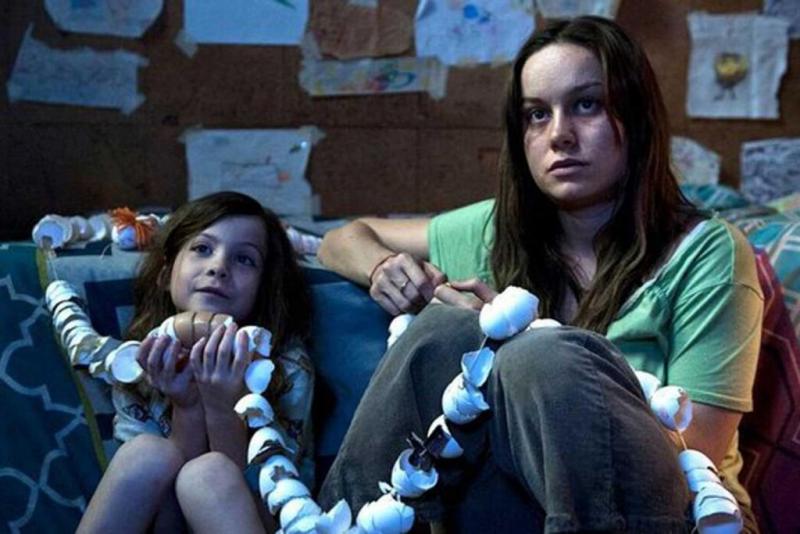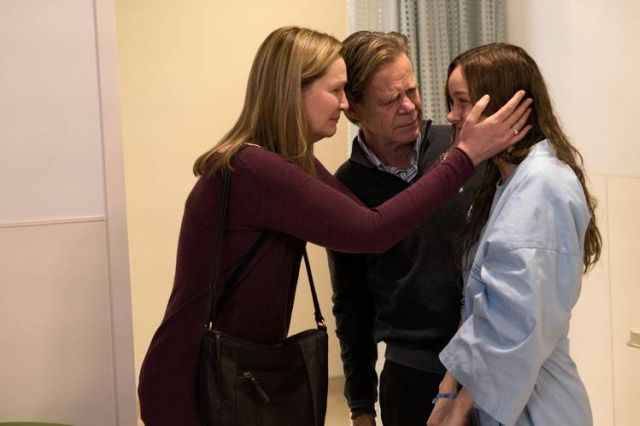Room review - when a house is not a home | reviews, news & interviews
Room review - when a house is not a home
Room review - when a house is not a home
Oscar hopeful about a confined space is vastly affecting

A copy of Lewis Carroll can be glimpsed amongst the otherwise grim, begrimed array of possessions made visible at the start of the extraordinary Room, and small wonder: Lenny Abrahamson's rightly lauded film is about two people who have fallen down a metaphorical rabbit hole – a mother and son whose shared bond sees them through conditions that neither individual would likely have survived on their own.
And with Golden Globe winner Brie Larson as the fiercely devoted Ma and the scarcely less astonishing youngster Jacob Tremblay as her adored and adoring son, Jack, Room tells a fight-and-flight story that begins with a forced captivity only to suggest by the end that life in its own sorrowful way makes captives of us all. Freedom, hard-won though it very much is by the determined, ever-resourceful Ma and her very smart son, remains a relative term right up until the final credits.
 Room has been a celluloid Cinderella story, gaining critical momentum on the festival circuit throughout the autumn and positioning the 26-year-old Larson as an Oscar frontrunner, not to mention another amazingly able American film actress whom the press can dote upon once they have had their fill of Jennifer Lawrence, who for the past several years has seemed to hold the corner on 20-something phenomena. Driving what for much of a tense, taut two hours is a two-hander that requires uncommon reserves of empathy and commitment, Larson (pictured above) makes palpable the lengths to which a mother will go on behalf of her child – alongside the degree to which that same mother herself retreats into childhood once she is reintroduced to the sharp glare of a world that she can only with difficulty call home. (Danny Cohen's lacerating camerawork is alive with ambivalence at every turn.)
Room has been a celluloid Cinderella story, gaining critical momentum on the festival circuit throughout the autumn and positioning the 26-year-old Larson as an Oscar frontrunner, not to mention another amazingly able American film actress whom the press can dote upon once they have had their fill of Jennifer Lawrence, who for the past several years has seemed to hold the corner on 20-something phenomena. Driving what for much of a tense, taut two hours is a two-hander that requires uncommon reserves of empathy and commitment, Larson (pictured above) makes palpable the lengths to which a mother will go on behalf of her child – alongside the degree to which that same mother herself retreats into childhood once she is reintroduced to the sharp glare of a world that she can only with difficulty call home. (Danny Cohen's lacerating camerawork is alive with ambivalence at every turn.)
Irish-born Canadian writer Emma Donoghue's 2010 novel of the same name was a finalist for the Man Booker Prize, and the novelist (unusually in such scenarios) stayed on to adapt her book for the screen. The result inevitably shifts the interiority that fuels the novel – the sense of being inside the head of a boy just turned five for whom words like Room and Wardrobe and Toilet and Sink acquire the imaginative power of friends and allies. So when Old Nick (Sean Bridgers), Ma's serial rapist and their captor, cuts the power and Ma decides that she and Jack have suffered an indignity too far, both parent and child devote themselves to seeking a new reality. So it is that Abrahamson lands one of many piercing moments when Jack catches his first glimpse of sky.
Everything about the pair's habitation underground is cunningly conveyed – Old Nick's periodic appearances, for instance, signaled by a man in his underwear, as if to indicate the only part of his anatomy that counts. And as Ma hatches a risky plan for escape that could easily go south, the film ratchets up the tension to such a level that it is moderately surprising to realise the story has some way still to go.
What about life back in the open air, with the media in thrall to Ma and Jack's tale? That proves its own distinctly mixed blessing, as the film riffs on the differences between a house and a home, real and pretend, what is actual and what's imagined. Thrown back on to her own family so as to adjust, for a while anyway, the defining relationship of her life with Jack, Ma must suddenly come to some kind of reckoning with her absence of seven years, and Joan Allen and William H Macy (pictured with Larson, below) bring polish to their scenes as family members who don't always treat Ma with the same intuitive grace with which their daughter, in turn, blessed Jack. It's only a shame that the ever-wonderful Allen doesn't get the big scene that one keeps anticipating.
 Jack, against the odds, even speaks of missing Room, which he characterises as having gone "every direction all the way to the end" – a phrase that could itself describe a movie whose psychological subtleties surprise throughout. Sure, Room could do without the swelling music that accompanies the climax, an aural cue that seems to belong to a less classy enterprise. But in pretty much every other way, the film delivers in ways that find key moments coming vividly to mind some months after my first experience of it. No praise is too high for the amazing Tremblay, playing a kid who calls his hair Strong like some sort of mini-Samson: the performance, far from betraying any evidence of the cutes, is wise beyond it and the actor's years. And the peerless Larson charts every shift in perspective of a child-woman forced to mature in unthinkable ways before her time, and for whom existence would have been a living death were it not for the boy she finally releases into that larger and none-too-easy room that we call the world.
Jack, against the odds, even speaks of missing Room, which he characterises as having gone "every direction all the way to the end" – a phrase that could itself describe a movie whose psychological subtleties surprise throughout. Sure, Room could do without the swelling music that accompanies the climax, an aural cue that seems to belong to a less classy enterprise. But in pretty much every other way, the film delivers in ways that find key moments coming vividly to mind some months after my first experience of it. No praise is too high for the amazing Tremblay, playing a kid who calls his hair Strong like some sort of mini-Samson: the performance, far from betraying any evidence of the cutes, is wise beyond it and the actor's years. And the peerless Larson charts every shift in perspective of a child-woman forced to mature in unthinkable ways before her time, and for whom existence would have been a living death were it not for the boy she finally releases into that larger and none-too-easy room that we call the world.
Overleaf: watch the trailer for Room
rating
Explore topics
Share this article
The future of Arts Journalism
You can stop theartsdesk.com closing!
We urgently need financing to survive. Our fundraising drive has thus far raised £49,000 but we need to reach £100,000 or we will be forced to close. Please contribute here: https://gofund.me/c3f6033d
And if you can forward this information to anyone who might assist, we’d be grateful.

Subscribe to theartsdesk.com
Thank you for continuing to read our work on theartsdesk.com. For unlimited access to every article in its entirety, including our archive of more than 15,000 pieces, we're asking for £5 per month or £40 per year. We feel it's a very good deal, and hope you do too.
To take a subscription now simply click here.
And if you're looking for that extra gift for a friend or family member, why not treat them to a theartsdesk.com gift subscription?
more Film
 Bugonia review - Yorgos Lanthimos on aliens, bees and conspiracy theories
Emma Stone and Jesse Plemons excel in a marvellously deranged black comedy
Bugonia review - Yorgos Lanthimos on aliens, bees and conspiracy theories
Emma Stone and Jesse Plemons excel in a marvellously deranged black comedy
 theartsdesk Q&A: director Kelly Reichardt on 'The Mastermind' and reliving the 1970s
The independent filmmaker discusses her intimate heist movie
theartsdesk Q&A: director Kelly Reichardt on 'The Mastermind' and reliving the 1970s
The independent filmmaker discusses her intimate heist movie
 Blu-ray: Wendy and Lucy
Down-and-out in rural Oregon: Kelly Reichardt's third feature packs a huge punch
Blu-ray: Wendy and Lucy
Down-and-out in rural Oregon: Kelly Reichardt's third feature packs a huge punch
 The Mastermind review - another slim but nourishing slice of Americana from Kelly Reichardt
Josh O'Connor is perfect casting as a cocky middle-class American adrift in the 1970s
The Mastermind review - another slim but nourishing slice of Americana from Kelly Reichardt
Josh O'Connor is perfect casting as a cocky middle-class American adrift in the 1970s
 Springsteen: Deliver Me From Nowhere review - the story of the Boss who isn't boss of his own head
A brooding trip on the Bruce Springsteen highway of hard knocks
Springsteen: Deliver Me From Nowhere review - the story of the Boss who isn't boss of his own head
A brooding trip on the Bruce Springsteen highway of hard knocks
 The Perfect Neighbor, Netflix review - Florida found-footage documentary is a harrowing watch
Sundance winner chronicles a death that should have been prevented
The Perfect Neighbor, Netflix review - Florida found-footage documentary is a harrowing watch
Sundance winner chronicles a death that should have been prevented
 Blu-ray: Le Quai des Brumes
Love twinkles in the gloom of Marcel Carné’s fogbound French poetic realist classic
Blu-ray: Le Quai des Brumes
Love twinkles in the gloom of Marcel Carné’s fogbound French poetic realist classic
 Frankenstein review - the Prometheus of the charnel house
Guillermo del Toro is fitfully inspired, but often lost in long-held ambitions
Frankenstein review - the Prometheus of the charnel house
Guillermo del Toro is fitfully inspired, but often lost in long-held ambitions
 London Film Festival 2025 - a Korean masterclass in black comedy and a Camus classic effectively realised
New films from Park Chan-wook, Gianfranco Rosi, François Ozon, Ildikó Enyedi and more
London Film Festival 2025 - a Korean masterclass in black comedy and a Camus classic effectively realised
New films from Park Chan-wook, Gianfranco Rosi, François Ozon, Ildikó Enyedi and more
 After the Hunt review - muddled #MeToo provocation
Julia Roberts excels despite misfiring drama
After the Hunt review - muddled #MeToo provocation
Julia Roberts excels despite misfiring drama
 Ballad of a Small Player review - Colin Farrell's all in as a gambler down on his luck
Conclave director Edward Berger swaps the Vatican for Asia's sin city
Ballad of a Small Player review - Colin Farrell's all in as a gambler down on his luck
Conclave director Edward Berger swaps the Vatican for Asia's sin city
 London Film Festival 2025 - Bradley Cooper channels John Bishop, the Boss goes to Nebraska, and a French pandemic
... not to mention Kristen Stewart's directing debut and a punchy prison drama
London Film Festival 2025 - Bradley Cooper channels John Bishop, the Boss goes to Nebraska, and a French pandemic
... not to mention Kristen Stewart's directing debut and a punchy prison drama

Add comment